Published: August 17, 2022, 10:45 a.m. U.S. Eastern Time
Media Contact: Kara Flynn, (202) 257-8424, press@ashg.org
ASHG with generous support from National Human Genome Research Institute (NHGRI), Biogen, GlaxoSmithKline (GSK), Merck & Co., Inc, and Roche, is pleased to recognize this year’s Scholars. The Human Genetics Scholars Initiative was developed to help advance diversity and inclusion in the human genetics research workforce. We also thank Impact Partners Illumina and Invitae, for supporting the Society’s diversity, equity, and inclusion initiatives.
Meet the 2022-2024 Human Genetic Scholars
 Kimberly Diaz Perez, BS
Kimberly Diaz Perez, BS
PhD Candidate
Emory University
kdiazpe@emory.edu
Kimberly Diaz Perez is a PhD candidate in the Genetics & Molecular Biology graduate program at Emory University. She obtained her Bachelor of Science in Biology from Georgia State University. Currently, Kimberly works with Dr. Elizabeth Leslie at Emory University, where her research focuses on exploring the role of rare genetic variants associated with orofacial clefts using whole-exome and whole-genome sequencing. As a Howard Hughes Medical Institute (HHMI) Gilliam fellow, she is an active advocate for diversity and inclusion in STEM, primarily focusing on increasing awareness about accessibility for individuals with disabilities in academia.
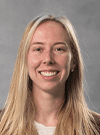 Paige Haffener, BS
Paige Haffener, BS
PhD Candidate
University of Utah
u1247633@utah.edu
Paige Haffener is a PhD Candidate in the Leffler Lab at the University of Utah. Originally from Oklahoma, she received a Bachelor of Science from Oklahoma City University in cell and molecular biology. In graduate school, Paige has transitioned into the field of population genomics. Her thesis work uses population genetic and genomic techniques to study the effects of admixture and selection on malaria susceptibility in human and non-human primate populations. In addition to research, she has taken a strong interest in science outreach programs that focus on building the interest and awareness of STEM careers for students from underrepresented groups in K-12 schools.
 Gabrielle Hampton, MS
Gabrielle Hampton, MS
PhD Candidate
Vanderbilt University
gabrielle.hampton@vanderbilt.edu
Gabrielle Hampton obtained a Bachelor of Science degree from Belmont University, a Master of Science from Lipscomb University, and she is currently pursuing a Doctoral degree from Vanderbilt University. Gabrielle’s current research interests include understanding chronic health disparities in individuals of African descent. Under the mentorship of Dr. Todd Edwards, her thesis work uses computational and statistical genetic approaches to identify and use shared genetic architecture to increase the utility of risk prediction models in diverse populations.
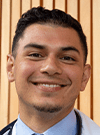 Eric Sosa, BS, MS
Eric Sosa, BS, MS
MD/PhD Candidate
Albert Einstein College of Medicine
eric.sosa@einsteinmed.edu
Eric Sosa is a Salvadoran-American from South Central Los Angeles. His mother moved to California to flee the political corruption of post-civil war El Salvador. At an early age Eric began working to financially assist his mother, whose health issues hindered her. He attended public schools where funding was low, and courses were overcrowded. Despite these odds, Eric graduated and was admitted to UCLA. Eric majored in Human Biology & Society, where he focused on the intertwining of disease and social determinants. Eric graduated in 2017 with highest departmental honors. In 2018, Eric matriculated at the Albert Einstein College of Medicine in the Bronx. He has begun his PhD training in Dr. John Greally’s lab; studying the role of non-coding variants in GABAergic neuron differentiation as a model for autism. Eric’s diverse learning experiences, at home and in the Bronx, has reinforced his commitment to research, and helping the underserved.
 Lizeth Tamayo, BS, MPH
Lizeth Tamayo, BS, MPH
PhD Candidate
University of Chicago
lizethtamayo@uchicago.edu
Lizeth Tamayo is a Ph.D. candidate in genetic epidemiology at the University of Chicago. She completed her undergraduate studies at Augustana College in Biochemistry and French and her Master of Public Health with a concentration in Epidemiology from the University of Illinois at Chicago School of Public Health. Her current research broadly focuses on the interplay between genetic and environmental factors and their impact on complex disease risk in low-resource and understudied populations. More specifically, she developed a dissertation project that bridges multiple aspects of methodological training related to genome-wide association studies, gene-environment interactions, and the implementation of a public health intervention of returning genetic results. She has also worked to understand specific molecular characteristics of breast cancer in Peruvian women with high Indigenous Ancestry. Outside of the lab, Lizeth enjoys reading, spending time with her family and friends, and rating French fries throughout the city.
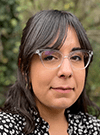 Adelaide Tovar, PhD
Adelaide Tovar, PhD
Postdoctoral Fellow
University of Michigan
adelaidetovar@gmail.com
Dr. Adelaide Tovar is a postdoctoral fellow at the University of Michigan where she uses multidisciplinary expertise in quantitative genetics, bioinformatics, and functional genomics to study the effects of genetic variation on transcriptional regulation and diabetes risk. In 2021, she earned her PhD in Genetics & Molecular Biology from the University of North Carolina at Chapel Hill. For her graduate research, she employed genetic and genomic approaches in a large, genetically diverse mouse population to discover gene-environment interactions with air pollution. Dr. Tovar is currently leading an effort to characterize regulatory activity across all known type 2 diabetes-associated variants as part of the Accelerating Medicines Partnership for Common Metabolic Diseases consortium and is a Burroughs Wellcome Fund Postdoctoral Diversity Enrichment Program Fellow (2022-2025).
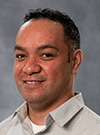 Travis Tu’ifua, BS
Travis Tu’ifua, BS
PhD Candidate
University of Utah
travis.tuifua@utah.edu
Travis Tu’ifua is a PhD candidate in the department of human genetics at the University of Utah. His thesis work is in functionally characterizing genetic modifiers of a rare congenital disorder of deglycosylation called NGLY1 deficiency. He has a passion for equity, diversity, and inclusion (EDI) work and serves in his PhD program’s EDI Task Force and his department’s EDI committee. Travis received his bachelor’s degree in Biomedical Engineering at the University of Utah. He is the father of three young girls and is married to the love of his life.
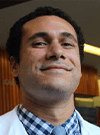 Matanel Yheskel, BS
Matanel Yheskel, BS
MSTP Student
Albert Einstein College of Medicine
matanel.yheskel@einsteinmed.edu
Matanel Yheskel graduated from the University of Texas at Austin with a degree in Biochemistry. He then was a technician at UT Southwestern Medical Center in the laboratory of Dr. Vishal Patel where he studied the role of microRNAs in Autosomal Dominant Polycystic Kidney Disease. He is currently pursuing his MD/PhD at Albert Einstein College of Medicine. He is performing his thesis research laboratory of Dr. Julie Secombe where he is studying how intellectual disability associated missense variants in histone demethylase KDM5C affect its function using Drosophila melanogaster as a model.
* * *
About the American Society of Human Genetics (ASHG)
Founded in 1948, the American Society of Human Genetics is the primary professional membership organization for human genetics specialists worldwide. Its community of nearly 8,000 members include researchers, academicians, clinicians, laboratory practice professionals, genetic counselors, nurses, and others with an interest in human genetics. The Society serves scientists, health professionals, and the public by providing forums to: (1) share research results through the ASHG Annual Meeting and in The American Journal of Human Genetics and Human Genetics and Genomics Advances; (2) advance genetic research by advocating for research support; (3) educate current and future genetics professionals, health care providers, advocates, policymakers, educators, students, and the public about all aspects of human genetics; and (4) promote genetic services and support responsible social and scientific policies. For more information, visit: http://www.ashg.org.
6120 Executive Blvd, Suite 500 | Rockville, MD 20852 | 301.634.7300 | society@ashg.org | www.ashg.org
Connect with ASHG on Twitter (@GeneticsSociety) | Facebook | LinkedIn
